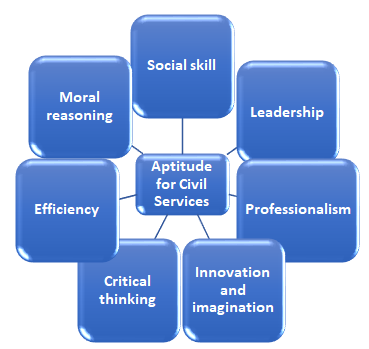Aptitude
Aptitude is a natural and innate ability to do something or learn something quickly in an effective way. Aptitude is a combination of characteristics and potential of the individual to acquire some specific knowledge, skills and proficiency with training. It is an element of excellence, competence and talent.
It plays a crucial role in career choices, education, and problem-solving. For example, Virat Kohli and Sachin Tendulkar have good aptitude in cricket.
For example, the types of aptitude that are required from a Civil servant include:
- Being Bold/Decisive
- Persuasive
- Emotionally Intelligent/Analytical/Mental ability.
- Effective communication/Comprehension
- Objectivity and impartiality
Characteristics of aptitude
- Aptitude is an innate potential: Aptitude is often considered an inherent quality. It’s something you’re born with, like a natural flair or talent for doing something. For example, some people have a natural aptitude for music. They can play instruments and pick up rhythms even without much formal training.
- Aptitude is multi-dimensional: It varies from task to task. For example, Niraj Chopra is good at juvenile throwing but may have low aptitude in the English language.
- Aptitude is a result of various combinations of factors- For example, the Interaction of heredity and environment may enhance the aptitude of the individual in a specific field.
- Aptitude predicts future ability and potential- It enables success in the future in a particular field. An aptitude test predicts the ability of an individual in a certain area and whether he is likely to succeed. Such tools can help assess student strengths or evaluate a potential job candidate’s strengths and weaknesses.
- Aptitude is different from ability: Ability entails the current performance of an individual, while aptitude is the future potential to achieve the maximum level of competence.
- Specific skill sets lead to Career Paths: Aptitude can be of various types like Intellectual, physical and motivational. It can be reflected in fields like musical, sports, clerical, art, academics, law, teaching, medicine, engineering, dancing, scientific, numerical, word fluency, unique relations aptitudes, etc.
- Aptitude can be measured: It is calculated by various tests to evaluate the aptitude of a person in any particular field. For example, the UPSC exam for civil services.
Aptitude and Ethics
Ethics is concerned with the principles and values that guide our behaviour and decision-making, while aptitude is the natural ability or talent to perform specific tasks effectively.
Ethics and Aptitude are interrelated. Those having good aptitude very easily learn ethical concepts and inculcate them in their behaviour.
There is some difference between ethics and Aptitude. Ethical behaviour is socially accepted behaviour. It has to be according to the society irrespective of the personal preference. Thus, ethics is different from aptitude as aptitude is an individual’s qualities.
Ethics without aptitude leads to compromise in the efficiency and effectiveness of any task and action. Ethics minus aptitude may sometimes act as counterproductive to individual progress and competence in life. For example, Prince Yudhishthira, son of the Pandu king, lacked talent for leadership and war skills but was highly ethical in the administration of the kingdom. In such cases, the individual may struggle to reconcile their natural abilities with their moral values, leading to conflicts and complex decision-making.
Aptitude and Attitude:
Aptitude is the innate ability of a person to acquire a new skill, while attitude shows the predisposition to it in certain situations and our outlook towards the world. Although different, both are important.
Both Aptitude and Attitude are important.
- Good Aptitude but bad attitude: At a professional level, for example, we will not get the best result if we have good skills but a bad attitude since interpersonal clashes and rigidity in ideas will end up becoming an obstacle to our development. For example, civil servants having skills but due to bad attitude can lead to corruption.
- Good Attitude but bad Aptitude: We also won’t get very far if we have a great attitude but lack the aptitude. There are certain areas where skills are essential, such as decision-making and interpersonal communication. For example, having a positive attitude towards women but a lack of administrative acumen in providing opportunities to women through good use of schemes and programs.
Since some skills are more challenging to develop than others, having them “out of the box” will greatly smooth the path, giving us an additional advantage.
- Therefore, trying to choose between attitude and aptitude by giving more weight to one or the other makes little sense. In general, it is essential to know our skills. Being aware of what we are best at, what we can do more fluently and with less effort. What we enjoy and for which we feel we were born because we do it as naturally as breathing.
- Once our unique “talents” are detected, we must ensure that we develop those skills with practice and accompany them with the right attitudes.
- The right attitude towards life can not only open many doors for us but also help us to be more optimistic, face obstacles with greater serenity, and make better decisions. Therefore, we need to make sure that aptitudes and attitudes always go hand in hand. This way, we will be able to feel more fulfilled and satisfied.
Difference between Attitude and Aptitude:
| Attitude | Aptitude |
| Attitude is a learned predisposition or a tendency to respond consistently towards an object favourably or unfavourably. | Aptitude is a natural and innate ability to do something or learn something quickly in an effective way. |
| It is influenced by beliefs, values, emotions, feelings and experience | Innate ability can be developed through training and practice |
| Attitude can be negative or positive towards the attitudinal object | Aptitude can be high or low and vary from person to person based on natural ability in a particular task |
| It influences a person’s behaviour, motivation and activity. | It influences a person’s career choices, growth and success. |
| It can be changed through personal efforts, self-learning and value education. | It can be developed through practice, training and continuous efforts. |
| Example: Positive attitude of civil servants towards the welfare of SCs and STs. | Example: Aptitude T.N.Seshan to deal with electoral reforms as chief election commissioner. |
Types of aptitude for Civil Services:
Aptitude refers to an individual’s natural ability to learn, understand, and perform specific tasks efficiently. People hold various types of potential in various fields including numerical, verbal, logical, and creative aptitude.
In general, we classify attitude in the following ways:
- Intellectual aptitude: This kind of aptitude is based on knowledge, intelligence, analysis, logic and rationality. It entails the intelligence quotient of civil servants. It focuses more on means than ends. It may not consider the consequence of the action and its ethical dimension.
We as civil servants must know how the trade war initiated by Donald Trump would impact our district, how climate change would impact the people the impact of the Ukraine-Russia war, or the actual impact of AI.
- Emotional aptitude: This aptitude mainly deals with emotional intelligence and social skills among civil servants in public service functions. This also includes how a civil servant controls his emotions, feelings and affection on duty. Emotion without moral reasoning and analysis may lead to ethical dissonance and a crisis of conscience.
We must know how to persuade people to achieve our administrative objectives.
- Moral aptitude: It includes moral values like fairness, justice, equality, inclusivity, empathy, compassion, tolerance, etc. It signifies the importance of both means and ends of any action of civil servants. Provides moral backing and foundation to the aptitude of an agent and upholds shared morality of society.
We must have an innate understanding of what is right and wrong. Killing an accused in an encounter, where there was the possibility of peaceful arrest.
Significance of aptitude for civil servants:
- Governance and Administration- A professionally qualitative, skilled and committed workforce is important for effective administration.

- Problem-solving- A civil servant with a positive mindset has more capacity to consume new information. The aptitude of moral reasoning and moral analysis of civil servants help in making principled decisions in case of ethical dilemmas.
- Implementation of Laws and Administrative Rules- Laws and rules do not provide details about the procedure for implementation on the ground level. In such cases, a civil servant needs an abundance of ethical decision-making skills and critical thinking ability to exercise discretion with conviction.
- Enhancement of resilience- In a country like India, civil servants face complex and contrasting socio-economic dilemmas and challenges on a daily basis, resulting in moral dissonance and ethical difficulties. This demands aptitude to overcome these contradictions and solve them.
- E-Governance- ‘Less Government More Governance’ demands transformational changes in the working of government as well as civil servants with efficiency and skill in innovative technology.




